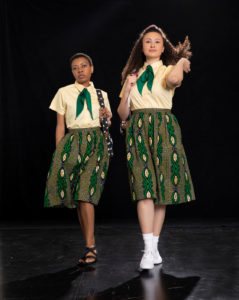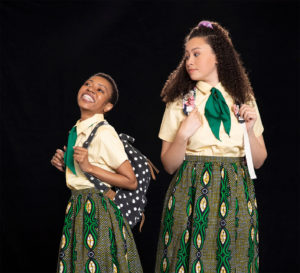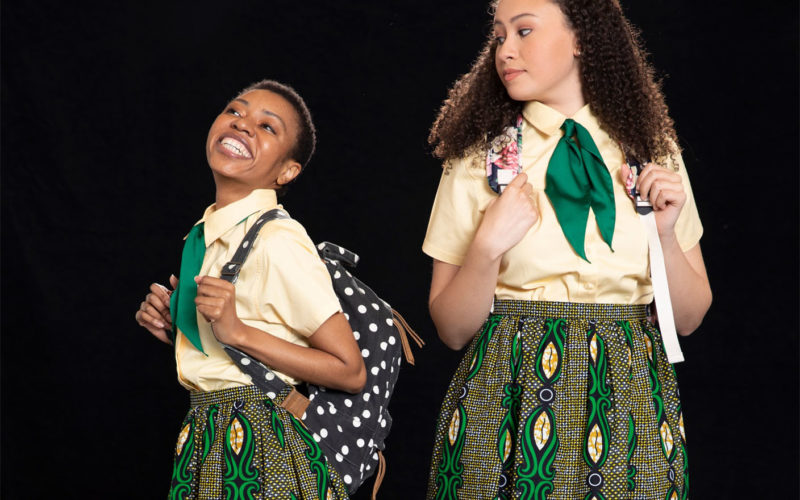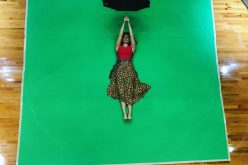T2’s ‘School Girls’ considers color, beauty and self
LARA JO HIGHTOWER
lhightower@nwadg.com
The New York Times called Jocelyn Bioh’s “School Girls; or, the African Mean Girls Play” a “gleeful African makeover of an American genre.” With its opening this week at TheatreSquared, audiences in Northwest Arkansas and beyond — the show will be streaming — will have the opportunity to see the funny, biting and ultimately impactful play that, says Bioh, was inspired after she read a news item about Ghana recruiting an American-raised, biracial young woman to represent the country in the Miss Universe Pageant.
“I wanted to explore the standards of beauty across the globe, because I think they’re more universal than some might think,” says Bioh of the play, which addresses the subject of colorism — discrimination against those with darker skin tones within groups of the same racial or ethnic backgrounds.

Makha Mthembu is Paulina and Amira Danan is Ericka in TheatreSquared’s production of “School Girls; or the African Mean Girls Play.”
(Courtesy Photo/Wesley Hitt for T2)
“From the opening scene of ‘School Girls’ through the Epilogue, Bioh has brilliantly and boldly examined the issue of the worldwide standard of beauty along with how, by whom, when, where and why it has been and is determined,” says the show’s director, Vickie Washington. Washington, says the online arts and culture blog Art and Seek, is “not just a mainstay but a foundation in Texas theater” as an actor, director and educator who has started and led two Black theater companies.
“Through their adolescent eyes and voices, these girls in Ghana, West Africa, clearly recognize that lighter skin and long hair are the ticket to fame and beauty. For me, what makes Bioh’s work so brilliant and so delicious is how she couches these very serious observations and conversations in the laugh-out-loud dialogue and antics of these teenage girls.”
“It’s amazing how many different ways we get to see Bioh bring this theme to life in ‘School Girls,’” says Amira Danan, who plays Ericka, the young woman who moves to Ghana from the United States. Danan is a Chicago-based actor who has appeared in productions at Steppenwolf and Goodman Theatre. “Before Ericka even comes into play, we see the girls associating their ideas of beauty with their weight, their love lives and even what kinds of access they have to a fashionable wardrobe, makeup, hair products, etc.
“Later on, Bioh focuses on colorism as it relates to beauty by bringing Ericka into this world, and we begin to explore the ways in which hair texture and skin tone inform these ideals.
“Finally,” Danan continues, “Bioh allows us to zoom out even further as the girls tune into the Miss Global Universe Pageant. Here, they witness the way women across the globe are judged by their proximity to European standards of beauty. Here, they learn that Ericka’s passing privilege, though it may elevate her in the eyes of the former Miss Ghana, is not enough to elevate her above white competitors in the eyes of the judges.”
The ensemble show comprises eight strong parts for Black actors — a rarity. An annual report released by the Asian American Performers Action Coalition and the American Theater Wing in October 2020 found that only 20 percent of shows in the 2017-18 season on Broadway and Off Broadway stages were created by people of color, and just one-third of the roles were filled by people of color. This dearth of parts for people of color became evident to Bioh quickly, when her career as an actor was still new — so she took her considerable talent to the page and started creating strong roles for herself and others. Her own skills as a comic actor and the people populating her personal life allow her to tackle heavy themes with a comic touch.
“They’re funny and wild and silly,” she said in an interview with The Times of her family members upon whom she sometimes bases characters. “They’re everyday people who are just trying to pursue extraordinary lives.”
“I don’t think I’ve ever had the chance to be in a show filled with so many women, specifically so many Black women, and I’m so grateful to be able to be in that position,” notes Danan. “A process like this gives us all a little more freedom to be ourselves and ask questions that will deepen the work. In other rooms, I don’t always allow myself to take up space, but here it’s been encouraged, which I think all of us can really appreciate.”
“As a mid-century Afrikan-ancestored, Black woman, so much of ‘School Girls’ resonates deeply with me,” says Washington. “The themes of belonging, friendship, jealousy, navigating cliques, beauty — who has it, who doesn’t — and who/what gets to decide what are the standards by which it will be determined who is deemed beautiful … all of this and more is present.
“While it’s been a few years, I still remember being a teenager and wanting very much to fit in. I was a tall, gangly, gap-toothed, four-eyed, short-haired Black girl, who had the blessing of parents, a family and a community who complimented and supported me, and yet I still wanted that acceptance of my peers. Additionally, the explorations of class differences, the negative power of secrets and the deeply disturbing practice of skin bleaching were things that I wanted to get in and ‘wrestle with’ in the framework of this play.”
Reviewers of previous productions of the play have noted the skill with which Bioh writes her characters — revealing vulnerabilities, eliciting empathy, but never hiding flaws, resulting in a character study that is, above all else, highly relatable.
“Honestly, I don’t think there was a theme in ‘School Girls’ that I couldn’t identify with in some way,” says Danan. “Whether that’s trying to achieve standards of beauty, navigating through the chaos that is high school, or feeling shameful about certain parts of your identity, the themes of this show explore emotions that we’ve all felt, whether that be as a teenager or an adult. The script fluctuates between joy, betrayal, pride and everything in between. And, as I mentioned before, these are by no means adolescent emotions.
“In addition, I don’t often see biracial (specifically white and black) stories represented with such depth and nuance, so I was also excited to find those parallels between Ericka and myself.”
“I’ve known those girls, and I’ve been most of them at certain times in my life,” adds actor Michelle Bester, who plays Gifty. Bester is a Chicago-based actor who has performed with the Black Ensemble Theater and the Civil Rights Opera in Chicago and has appeared on the television show “Chicago Fire.”

“Working on this play has only reminded and re-inforced the notion that we never leave high school,” says director Vickie Washington. “That, throughout our lives, particularly as women, we are always confronted with those conflicts both with ourselves and often with each other. And while it highlights how petty these things can be, they are very real and relevant to how we build a sense of self and relationships with each other. What it has informed me about, though, is how important it is to truly uplift and complement each other. As people, we all have insecurities, be it in our physicality, talents, backgrounds, etc. But those things shape who we are and how different we are. And they all deserve to be acknowledged and celebrated. Not judged and held against us.”
(Courtesy Photo/Wesley Hitt for T2)
“There are so many mirrors in this play, and the concept it explores of looking into them honestly, even when it hurts, is so valid. I very much relate to the role of Headmistress Francis and what it’s like to have lived a certain experience and teach/uplift from it to then also be confronted by someone from your past who can make you, for even a moment, re-live some of those thoughts, feelings, even insecurities you thought you’d outgrown. The conflict of size versus colorism growing up was always a major thing for me, and seeing myself as beautiful outside (and inside) of my size was a struggle. But the themes of growing up, standing up and enjoying your youth through all phases of your life is key.”
FAQ
‘School Girls; or the African Mean Girls Play’
WHEN — Jan. 20-Feb. 14
WHERE — Streaming from TheatreSquared
COST — $20-$35
INFO — theatre2.org










